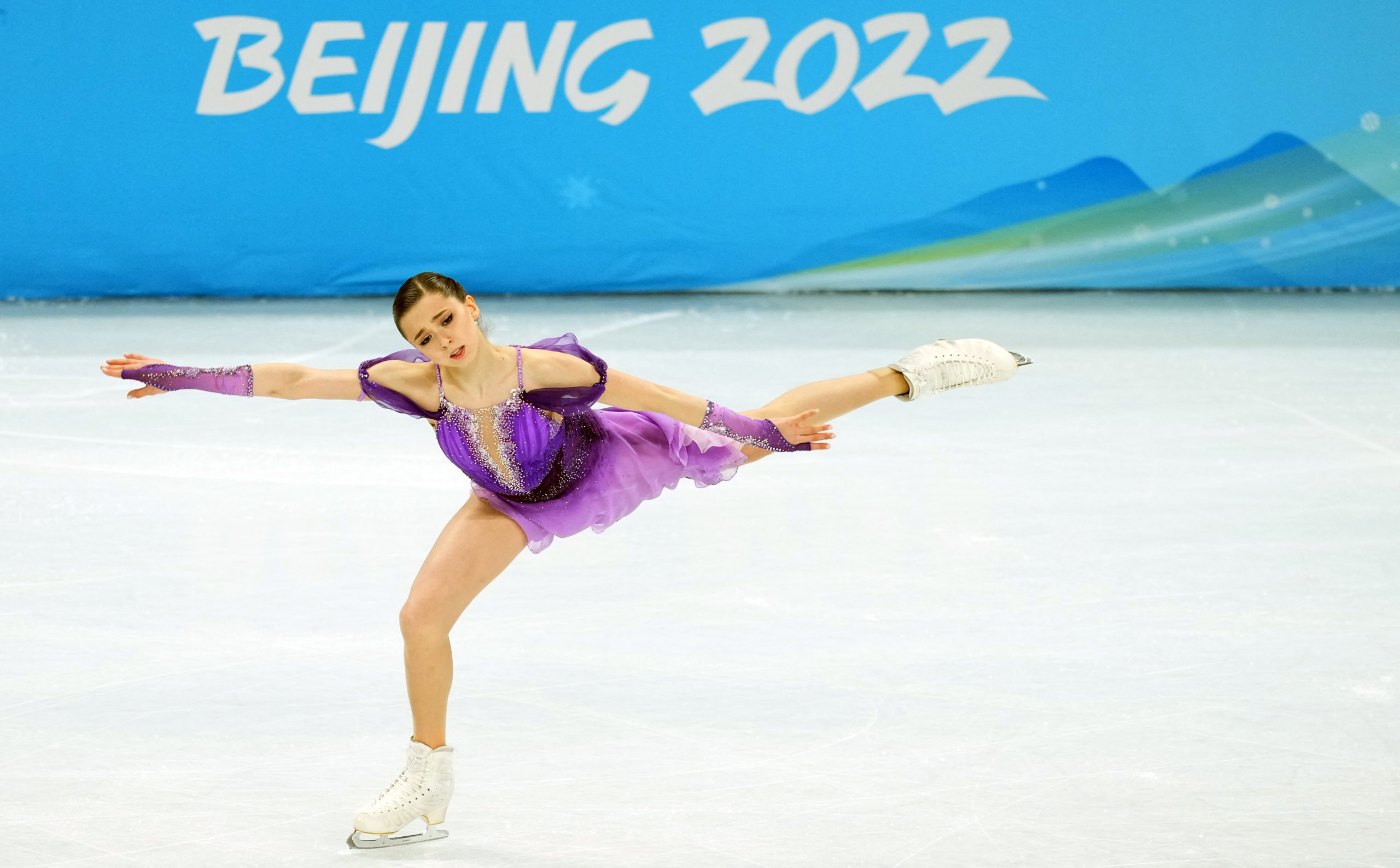Russian skater Kamila Valieva suspended four years for doping

2022 Beijing Olympics – Figure Skating – Women Single Skating – Short Program – Capital Indoor Stadium, Beijing, China – February 15, 2022. Kamila Valieva of the Russian Olympic Committee in action. REUTERS/Aleksandra Szmigiel
Teenage Russian figure skater Kamila Valieva received a four-year ban from the Court of Arbitration for Sport (CAS) on Monday for failing a doping test prior to the 2022 Winter Olympics.
Valieva was found to have “committed an Anti-Doping Rule Violation (ADRV) under Clause 4.1 of the All-Russian Anti-Doping Rules of 24 June 2021,” said the three-member panel in sport’s highest court.
“A period of four years ineligibility is imposed on Ms Valieva, starting on 25 December 2021.
“All competitive results of Ms Valieva from 25 December 2021 are disqualified, with all the resulting consequences (including forfeiture of any titles, awards, medals, profits, prizes, and appearance money),” CAS added.
READ: Kamila Valieva had multiple substances in system–report
The punishment will sit well with both the World Anti-Doping Agency (WADA) and the sport’s governing body the International Skating Union (ISU) who had requested such a sanction.
Valieva was just 15 when she tested positive raising questions not just about her guilt and the Russian Olympic system after the Sochi Winter Games of 2014 but how she was treated as a minor, the way the test was conducted and the value of the drug involved for enhancing performance.
The case came to CAS following Valieva’s exoneration by Russia’s anti-doping agency (RUSADA).
WADA and the ISU then appealed RUSADA’s ruling, as did RUSADA itself.
Three CAS judges met in Lausanne in September to hear the case with Valieva and some of the experts and witnesses taking part via videoconference.
‘Gait disorders’
In Beijing in February 2022, Valieva became the first female skater to land a quadruple jump in Olympic competition, helping Russia secure gold in the team event.
The next day, she was told she had tested positive before the Games for trimetazidine, a drug used to treat angina but banned for athletes.
With CAS’s ruling, the podium in the team event should now result in the United States being awarded gold, Japan silver and Canada bronze.
Under the pressure of suspicion and attention, Valieva cracked in the individual event in Beijing, stumbling four times in the long programme and finishing in tears as she tumbled from first to fourth.
READ: Kamila Valieva dominates the ice despite doping scandal
At the end of the year, RUSADA ruled that Valieva bore “no fault or negligence” for the positive test.
From the start, the case has presented a dilemma. Valieva’s age, 15 at the time, should have guaranteed her confidentiality under WADA rules for “protected persons” younger than 16.
But Valieva’s display in the team event in the Olympic arena had already drawn worldwide attention.
The ISU is raising the lower age limit for its senior category from 15 to 17 from this year, citing the “physical, mental and emotional health” of competitors.
RUSADA tested the skater on December 25, 2021, as she won the Russian championships.
They sent the sample to the WADA-accredited laboratory in Stockholm. The lab found a minute concentration of trimetazidine but, delayed by the Covid pandemic, the result was not delivered until the middle of the Olympics.
After being cleared by RUSADA, Valieva returned to competition, taking second place in the Russian championships at the end of 2022.
Last November, she won the Russian Grand Prix in spite of falling twice in the free skate, and could only finish third behind Sofia Muravieva and 16-year-old Adeliia Petrosian in the 2023 national championships.
In her defence, Valieva blamed “contamination by cutlery” shared with her grandfather, who was treated with trimetazidine after receiving an artificial heart, and who drove her to training every day.
In 2018, sports authorities accepted two cases of accidental trimetazidine contamination.
CAS accepted that American swimmer Madisyn Cox had consumed the drug in a multivitamin.
The court also accepted that contamination led to Russian bobsledder Nadezhda Sergeeva’s positive test at the Pyeongchang Olympics, but did not reinstate her result at the Games.
Doubt surrounds the value of trimetazidine due in particular to its “numerous side effects” ranging from “gait disorders” to “hallucinations”.